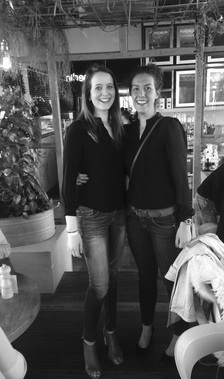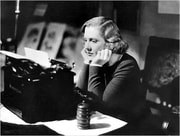 Amy Baldauf and Anna-Zoë Herr, effortless Amy Baldauf and Anna-Zoë Herr, effortless A guest post by Amy Baldauf I’m sure we’re all familiar with the phrase – “Life is what happens to you while you’busy making other plans” (John Lennon). And yet, do any of us really take these insightful words to heart? If so, the moments when we find ourselves frustrated, confused, lost, or downtrodden about current, future, or even past situations and scenarios would then, ultimately, define our life. That’s right. Think about that. These heavy feelings, constantly being present in our thought and then manifested in our experiences, would shape how we are and how we choose to live. I don’t know about you, but that doesn’t sound like the type of life that I want to lead, or the kind of life that I envision myself leading in the future. But how can we change our habits, especially when it comes to our ways of thinking? Thankfully enough, there’s an answer to this, and it’s as simple as finding a way to uplift our thought. I’ve often found that believing in something better, or at least finding ways to value and choose positivity are valued by most people, uniting us all, regardless of our beliefs, in some respect. But what can bring even more comfort and reassurance is to bring our thought up to a higher, more analytical level – which includes recognizing our lives as a part of, and expressing something much more than just positivity, or wishful thinking. Mary Baker Eddy, the discoverer and founder of Christian Science, describes this as ‘divine Life’. With this distinction, “[divine] Life is not limited” (Science and Health, p.469: 4-5). While divine Life can be described in more nuanced and philosophical ways, I like to think about what it practically means to us. How can we demonstrate divine Life in our own experiences? What we can think about are the qualities associated with Life. These include: liveliness, being, wholeness, discovery, persistence, motion, effortlessness,seamlessness, abundance, health, and now. In thinking about these qualities, each one, individually, situations that try to present themselves as difficult, tenuous, difficult, or stressful are in fact in direct opposition to these qualities that we know to be true, and that we want to see in our experiences. So whilst it may be tempting to define our lives as having the right schedules, getting that job, or just being busy, what if, instead, we defined Life as demonstrating even one of these qualities? For example, what if we chose to focus on effortlessness in our lives? How do you think that would feel? And what would life be like if we weren’t too busy making plans? This seems like the right way to think and act. And I don’t know about you, but I’m ready to start, right away. That’s the right sort of plan to make. Amy Baldauf is busy not making plans. You can reach her at amyirja@gmail.com or follow her @amyirja on Twitter. |
Who is writing?
In my work as Christian Science practitioner and writer I draw on listening to God and listening to people. Categories
All
My Archive
October 2023
|




